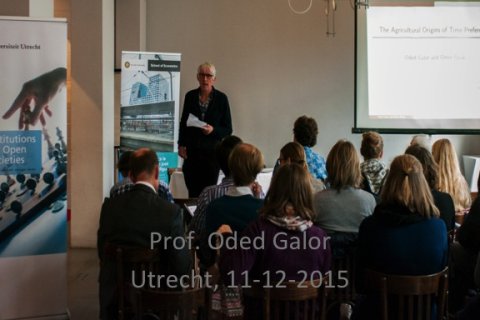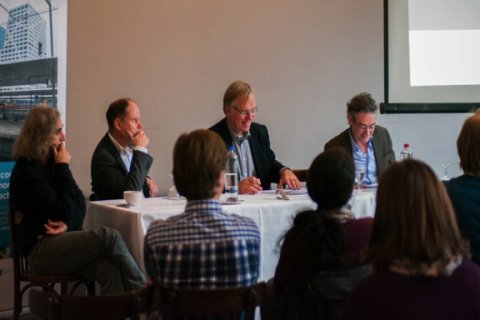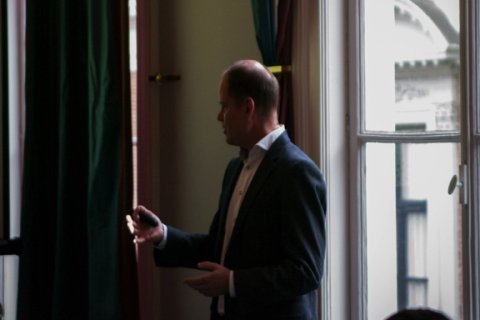Report Workshop at U.S.E. by Oded Galor
PhD-students and Postdoc researchers pitch their research

On 10 and 11 December, Professor Oded Galor (Professor of Economics at Brown University) visited Utrecht University School of Economics, Institutions for the Open Society and the Institute for Economic and Social History. In a joint session on December 10th PhD-students and Postdoc researchers from all groups pitched their research to Professor Galor and got useful feedback on how to position their work, think about their research questions and improve their papers.
The two day program was kicked off by a small session in which 3 PhD students and 3 Post-docs from the departments of Economics and Economic History ‘pitched’ their research to Oded Galor, who then commented on their work after which the floor was opened for general discussion. This led to an inspiring afternoon with interesting new insights. All the working papers can be found here.

Research on poverty measures
The session was opened by Michail Moatsos (Phd Student Economic History), who presented his research on poverty measures and why the currently used measures by the World Bank may lead to biases and discrepancies. The proposed method by Moatsos is the use of Bare Bone Baskets, and using this measure fundamentally changes the geography and development of global absolute poverty. Prof. Galor pointed to the evolution of the caloric intake with respect to the changes of human metrics in time and across regions, but in the BBB approach this is accounted for by re-estimating yearly the minimum caloric requirement of the population in each country according to the prevailing anthropometric data and demographic composition.
Quantity versus Quality
In the second session Auke Rijpma (post-doc Economic History) presented his paper "Quantity versus Quality: Household structure, number of siblings, and educational attainment in the long nineteenth century”. It analyses the quantity-quality trade-off and other household-level influences on educational outcomes of children. Nineteenth and early-twentieth century census micro-data is used, providing material from Western and Eastern Europe, the USA and Canada. This is the time-frame of the demographic transition and the onset of modern economic growth. Besides the number of siblings, other household features can be of influence as well, such as the gender composition, the inclusion of members outside the nuclear family and the position of women in the household. The authors find mixed evidence for the quantity-quality trade-off, as well as positive effects of the presence of (upwards) extended family members and parental, especially maternal, literacy. Oded Galor pointed out that the definition of the tradeoff was not made explicit and referred to the importance of random variation in shocks in fertility, preferences, or child costs. This led to an interesting discussion about the possibility of applying these methods in the country-comparative perspective of the paper.

Institutional Diffusion between Societies
The third paper, “Mechanisms of Institutional Diffusion between Societies” was presented by Krista Bruns (PhD student Utrecht School of Economics). In this paper, the spread of women’s suffrage was analyzed in a duration analysis, to uncover the process of diffusion. The paper aims to show how this diffusion may be analyzed by different types of contact between countries and whether different types of contact are important for early versus late adopters. Oded Galor commented that there is no such thing as ‘the right institutions’, as different stages of development ask for different institutions. Therefore it may be more insightful to see whether there is more diffusion between countries that are in the same stage of development.
Economic development in a limited access-order
After a short break Bram van Besouw (Phd Student Economic History) continued the session with the paper “Economic development in a limited access-order: North-western Europe, c.1000-1700”. The authors model a ‘limited access order’ as described by North et al (2009) and focus on the endogenous process that might propel societies into the next phase of development – an open access societies. The discussion revolved mainly on how the distribution of different ‘types’ in society came about and whether this could also be endogenized.

Family Systems, Female Agency and (Economic) Development
Selin Dilli presented her paper, “Family Systems, Female Agency and (Economic) Development" which studies the relevance of family systems that discriminate against women for the economic development of societies in the world, c.1850-2000. Her study reveals that lower female agency, especially as measured by gender inegalitarian inheritance practices and early marriages, is negatively related with economic development. Her study also provides evidence on the channels through which family systems related to gender equality matter for economic development, which are in particular. Galor suggested that it is also useful to study and provide evidence the historical role played by economic development versus historical institutions in shaping family practices that discriminate against women to deal with some of the concerns related to reverse causality.
Explaining the Reversal of Fortune in EurAsia
The session was closed by Sarah Carmichael, presenting the paper “Gender Relations, Family Systems and Economic Development: Explaining the Reversal of Fortune in EurAsia”, which argues that gender relations matter for economic development and can help to explain growth trajectories in EurAsia between the Neolithic and the present. In particular, female agency was conducive to growth both in the period 1500-1800 and 1800-2000, but the ‘reversal of fortune’ that took place in EurAsia between 1000 and 2000 can be explained by the spatial patterns in gender relations and family systems. There was a vivid discussion on the influence of the Neolithic revolution and Oded Galor suggested to include the timing of the Neolithic revolution in the model, as well as look at the ethnic group level.

Seminar Oded Galor “The Agricultural Origins of Time”
On December 11th Prof. Galor gave a seminar in which he showed convincingly that time preference is a socially transmitted characteristic that can be traced back to the productivity of agriculture around the Neolithic revolution. His seminar was an excellent example of the strength of multidisciplinary research. It is clear that in studying economic growth today, time preferences are key. But they are typically also assumed to be given. Economists do not explain preferences. To understand them economists need to understand sociology and biology as well as history. The work by Prof. Galor is using the economists' toolbox to shed light on this important issue and his presentation was exemplary to the type of research Utrecht university aspires to.
In this paper, Galor together with his coauthor Ömer Özak show that the agricultural environment in which early societies lived has a persistent impact on the ability of those people to delay gratification. The coevolution of human traits and the economic environment is a popular topic nowadays in general, and explaining the ability to delay gratification is important because it is linked to important phenomena at the micro and macro level, such as academic achievements, human and physical capital formation and technological advancement. The paper shows that historical variations in the return to agricultural investment across regions (due to different crop yields) leads to differences in time preference. This mechanism can manifest itself either through sorting, learning, and reproductive success, where individuals with higher time-preference have an evolutionary advantage in certain circumstances. The testable hypotheses from the theoretical model are largely confirmed in empirical analysis, using different identification strategies and robustness checks.
The full working paper can be found here.

Panel Discussion: Future Trends in the Economics of Growth
Prof. Galor is also editor in chief of the Journal of Economic Growth that celebrates its 20th volume this year. In the afternoon Prof. Galor therefore joined Prof. Sjak Smulders (UvT), Prof. Eelke de Jong (KUN), Prof. Marcel Timmer (RUG) and Prof. Bas van Bavel (UU) in a discussion on the future of economic growth as a field. There is no space to do justice to the nuanced and elaborate contributions of all speakers in this debate. Prof. Timmer suggested the introduction of broader welfare concepts than GDP might seriously affect the field, putting social and ecological sustainability on the table. In line with that Prof. Smulders proposed that in the study of economic growth more attention will have to be paid to ecology and inequality and Prof. De Jong stressed the importance of history in identifying causality, arguing we should go beyond instrumental variables and exploit also the narrative of history. Whereafter Prof. Van Bavel could nicely wrap up the discussion by suggesting we can learn from history how societies in the past (un)successfully handled growth and decline.
Unified economic growth theory
Although the issues raised make up an interesting and important empirical research agenda, Prof. Galor pointed out that most of the issues raised can be handled well enough with the theoretical framework that is unified economic growth theory. The issue of reversal, however, did cause some discussion. History has shown the emergence and decline of countries and regions experiencing sustained periods of relatively high growth and prosperity. But several have ultimately succumbed to internal or external pressures and returned to the Malthusian state. Anecdotal evidence suggests that rising inequality, ecological degradation and institutional sclerosis are all prime suspects and little is understood on how exactly success may breed its own demise. A unified growth theory should not end with modern growth as "the end history". Prof. Galor did agree that this research agenda certainly has merit and creates a host of fruitful research opportunities for the future. On that note all could go back to work inspired for the approaching new year.

